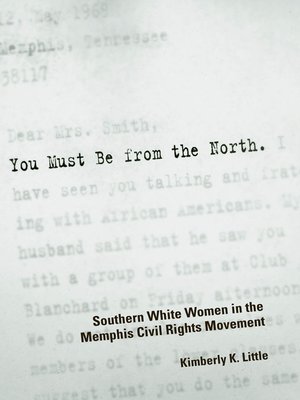You Must Be from the North
ebook ∣ Southern White Women in the Memphis Civil Rights Movement
By Kimberly K. Little

Sign up to save your library
With an OverDrive account, you can save your favorite libraries for at-a-glance information about availability. Find out more about OverDrive accounts.
Find this title in Libby, the library reading app by OverDrive.



Search for a digital library with this title
Title found at these libraries:
| Library Name | Distance |
|---|---|
| Loading... |
"You must be from the North," was a common, derogatory reaction to the activities of white women throughout the South, well-meaning wives and mothers who joined together to improve schools or local sanitation but found their efforts decried as more troublesome civil rights agitation. You Must Be from the North: Southern White Women in the Memphis Civil Rights Movement focuses on a generation of white women in Memphis, Tennessee, born between the two World Wars and typically omitted from the history of the civil rights movement. The women for the most part did not jeopardize their lives by participating alongside black activists in sit-ins and freedom rides. Instead, they began their journey into civil rights activism as a result of their commitment to traditional female roles through such organizations as the Junior League. What originated as a way to do charitable work, however, evolved into more substantive political action.
While involvement with groups devoted to feeding schoolchildren and expanding Bible study sessions seemed benign, these white women's growing awareness of racial disparities in Memphis and elsewhere caused them to question the South's hierarchies in ways many of their peers did not. Ultimately, they found themselves challenging segregation more directly, found themselves ostracized as a result, and discovered they were often distrusted by a justifiably suspicious black community. Their newly discovered commitment to civil rights contributed to the success of the city's sanitation workers' strike of 1968. Dr. Martin Luther King, Jr.'s death during the strike resonated so deeply that for many of these women it became a defining moment. In the long term, these women proved to be a persistent and progressive influence upon the attitudes of the white population of Memphis, and particularly on the city's elite.







